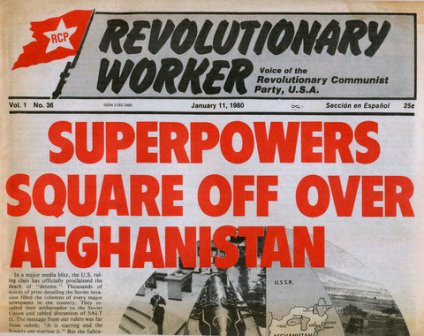
First Published: Revolutionary Worker, Vol. 1, No. 36, January 11, 1980.
Transcription, Editing and Markup: Paul Saba
Copyright: This work is in the Public Domain under the Creative Commons Common Deed. You can freely copy, distribute and display this work; as well as make derivative and commercial works. Please credit the Encyclopedia of Anti-Revisionism On-Line as your source, include the url to this work, and note any of the transcribers, editors & proofreaders above.
Liu Shao-chi, the Number 1 capitalist reader in China until he was yanked down from his throne during the great storms of the Cultural Revolution. “China’s Khrushchev.” Saboteur of socialist revolution and socialist construction. Mortal enemy of Chairman Mao Tsetung and everything he stood for and fought for. When Liu’s political associate, Teng Hsiao-ping, seized power in China after Mao’s death, it was inevitable that Liu, whose name had become a profanity in China, would one day be restored to a position of “honor.” The only question was–when?
It is now 99.9% official. Liu Shao-chi is being officially and fondly referred to as “Comrade” Liu. The December 1979 issue of Red Flag, the Chinese Communist Party’s theoretical journal, quotes from a speech by the revisionist novelist Ding Ling, another target of the Cultural Revolution, at the recent national art and literature conference. Ding Ling says that “His (Comrade Liu’s) words were etched in my memory,” and that they gave her “great encouragement” while she was under attack by the revolutionaries. This published reference to Liu as “comrade” represents official approval. Earlier, Liu’s picture, as well as a drawing depicting him standing alongside Mao, appeared in the November issue of China’s magazine, Chinese Youth–the first in an official publication since Liu was knocked from power. And Liu was prominently featured in an official photo exhibition of the party’s history (see RW, Oct. 6).
It was inevitable that Liu’s “honor” would be restored sooner or later (although he has since died). After all, the capitalist policies Liu pushed as President of the People’s Republic (a post later abolished during the Cultural Revolution) have all been revived with a vengeance by the revisionist rulers Hua and Teng. Universities are once again ivory towers. Workers and peasants who fought in their millions against attempts by traitors like Liu to restore capitalism are now told to slave for the “four modernizations.” And the only regret Teng and Co. have is that their sacred “four modernizations” have not allowed them to perfect a technique to physically resurrect their departed “comrade.”
This Liu revival is really taking off. Mao’s Red Book, now banned, is being replaced by a new book soon to be published, called “Basic Knowledge of the Party,” which reportedly includes many passages from Liu’s infamous work, “How to Be a Good Communist.” Liu’s book glorified Confucianism and contained scathing attacks on revolutionaries as well as thinly disguised shots aimed at Mao. While the Red Book was wielded by hundreds of millions as a weapon to spread Mao’s line against the capitalist roaders, and against Liu in particular, the new book of revisionist “wisdom” will serve the opposite purpose.
All this goes hand in hand with the continuing attacks on Mao’s line, including personal attacks on Mao himself. While “China’s Khrushchev” is now “Comrade Liu,” Chairman Mao is downgraded to simply Comrade Mao. Officially reviving Liu is essential to the revisionists in creating public opinion for the upcoming trial of the Four (Mao’s genuine revolutionary comrades)–which is actually a trial of Mao Tsetung and his revolutionary political line.
The revisionist rulers cannot bring back Liu himself. But thousands of lesser Lius, many knocked down during the Cultural Revolution, have already, been returned to positions of power, while many revolutionaries have been jailed or killed. No matter how much political make-up the revisionists put on Liu, he’s a “comrade” only to the revisionist butchers themselves. For the people and for genuine revolutionaries around the world, the verdict on Liu Shao-chi remains as stated in 1966– “hidden traitor and scab.”